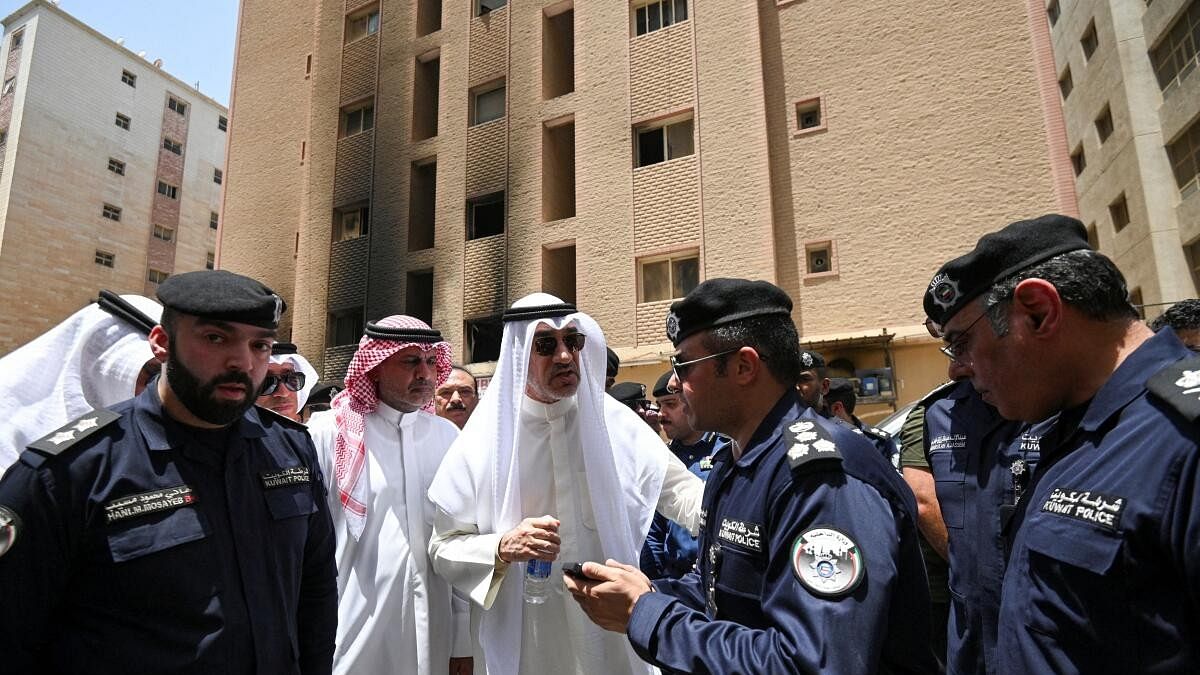
Kuwait's Deputy Prime Minister and Minister of Defense and acting Interior Minister, Fahad Yusuf Al-Sabah speaks with police officers in front of a burnt building, following a deadly fire, in Mangaf, southern Kuwait, June 12, 2024.
Credit: Reuters Photo
Over 1400 Indians – mostly blue-collared workers – died in Kuwait in the past two years.
India’s embassy in the capital of Kuwait received over 16,000 complaints from the country’s citizens working in the Persian Gulf nation between March 2021 and December 2023, mostly about delays in payment of salaries, sub-standard accommodation, and harassment.
With nearly 40 Indians being among the 49 killed in the devastating fire in a building housing migrant workers in Kuwait City early on Wednesday, the focus is now back on the difficult working and living conditions that people traveling to the West Asia nations in search of livelihood have to reconcile with.
Altogether 731 and 708 Indians, mostly migrant workers, died in Kuwait in 2022 and 2023, according to the information that the Ministry of External Affairs (MEA) presented in Parliament in response to a query on February 2 this year. The 2020 and 2021 – the Covid-19 years – had seen 1279 and 1201 Indians dying in Kuwait.
Altogether 2932 Indians died in Kuwait between 2014 and 2018. Twenty-four of the 659 Indians, who died in Kuwait in 2018 were residents of Karnataka.
A large number of Indians had come back home from Kuwait during the Covid-19 pandemic. The search for livelihood, however, took 10,158 and 71,432 Indians to the Persian Gulf nation in 2021 and 2022, according to the information available with the MEA.
Prime Minister Narendra Modi termed the fire mishap in Kuwait City on Wednesday ‘saddening’. “My thoughts are with all those who have lost their near and dear ones. I pray that the injured recover at the earliest,” he posted on X.
External Affairs Minister S Jaishankar also wrote on the social media platform that he was deeply shocked by the news of the fire in the capital of Kuwait. “Our embassy will render the fullest assistance to all concerned in this regard,” added the external affairs minister, who, along with Foreign Secretary V M Kwatra, briefed the prime minister about the incident and the assistance being provided by the Embassy of India in Kuwait City to the injured and the families of the deceased.
Modi announced an ex-gratia relief of Rs 2 lakh to the families of the deceased Indians from the Prime Minister’s Relief Fund.
The prime minister asked Kirti Vardhan Singh, the new Minister of State for External Affairs, to travel to Kuwait City immediately to oversee the efforts to help the injured and to coordinate with the authorities in the Persian Gulf nation for early repatriation of the mortal remains of the deceased.
New Delhi’s envoy to Kuwait City, Adarsh Swaika, visited the scene of the fire mishap as well as several hospitals, where the injured were undergoing treatment.
The Embassy of India opened helpline numbers for the families of the injured and the deceased to seek help.
India’s embassies in Bahrain, Qatar, Saidi Arabia, United Arab Emirates, Oman, and Kuwait received as many as 33252 complaints from workers who migrated from the country to the West Asian nations. Almost half of the complaints – 16436 – were received at New Delhi’s diplomatic mission in Kuwait City from the Indians, who migrated to the oil-rich Persian Gulf nation in search of livelihood. The complaints were mostly about delays in payment or non-payment of salaries, retention of passports by employers, unfair working conditions, sub-standard accommodation, extended working hours, ill-treatment, or harassment.
Kuwait’s First Deputy Prime Minister Sheikh Fahad Al-Yousuf Al-Sabah ordered police to arrest the owner of the building where the fire broke out early on Wednesday. He also ordered the arrest of the owner of the company that the injured and deceased workers worked for. “What happened today is a result of the greed of the company and building owners,” the deputy prime minister told journalists on the scene.
The building purportedly housed over 190 workers.
Sheikh Fahad gave orders to Kuwait Municipality and the Public Authority for Manpower to immediately act on similar violations where large numbers of workers are crammed into one residential building. He also ordered the local authorities to make sure that all safety requirements were in place.
